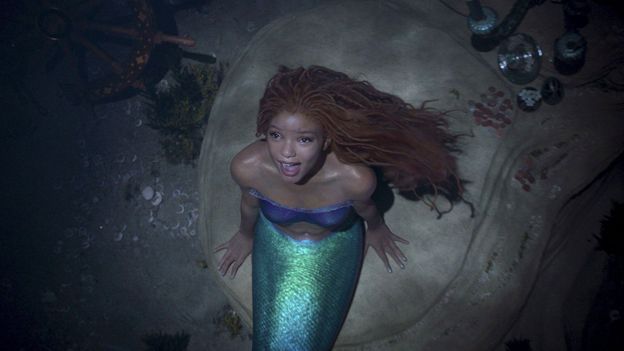The films too badly-lit to see properly


When a clip from Disney’s forthcoming live-action film of The Little Mermaid was shown at the MTV Awards on 7 May, fans of the original 1989 cartoon declared on social media that they couldn’t see the appeal. Or, to be more accurate, they declared that they couldn’t see anything at all. Commenter after commenter complained that a supposedly magical and romantic scene between Ariel (Halle Bailey) and Prince Eric (Jonah Hauer-King) was so dark and dingy that they could barely tell what was going on. True, the scene takes place at night, but even so… “Where’s the light? Where’s the colour? This looks so dull,” grumbled one Twitter user. “Did all the lightbulbs blow at the same time on set,” asked another. It was the biggest protest against a film’s murky lighting since… well, since the last time Disney released a clip from one of its live-action remakes, Peter Pan & Wendy, two months earlier.
More like this:
– 10 of the best films to watch in May
– Ghosted and the films too bad for the cinema
– Is the superhero film dead?
This isn’t just an issue with Disney fairy tales, though. Whether they’ve sat through such blockbusters as The Batman and Avengers: Endgame, or such epic television series as Game of Thrones and The Mandalorian, viewers regularly take to social media now to say that watching today’s mega-budget entertainment can be like peering into a cave on a cloudy evening. And their bewilderment with this dreary lighting is balanced by their astonishment at the brightness and sharpness of Hollywood hits from previous decades. One example that comes up is the finale of 1997’s Titanic. It’s set in the middle of an ocean in the middle of the night, but you don’t need to squint to see what Jack and Rose are doing.
To be fair, it should be noted that clips and trailers are bound to look dimmer on your phone in broad daylight than they are when projected onto a big screen in a cinema. But specialists who have compared the palettes of new and old films confirm that this gloomy trend isn’t just about our phones or our rose-tinted memories: as far as cinematography is concerned, we really are living in the dark ages.
So why are so many filmmakers keeping the lights low? The simple answer is: because they can. It’s been a decade since digital video overtook the use of celluloid, and by 2016 more than 90% of films were shot digitally. One change wrought by this technology is that directors now have video monitors on set to show them exactly what the cameras are capturing. They can see immediately whether all of the details they need are there on screen, so they can experiment with lower lighting. With celluloid, there is no equivalent way to check in real time whether or not a scene is too shadowy, so “the safest bet is to shoot with plenty of light, even if scenes are meant to be dark,” reports Edward Vega in a Vox video on the topic. Not so with digital. The new technology has liberated directors to make their films inkier than ever before.
But why should they want their work to look as if it was shot during a solar eclipse? One reason is that, for the past decade, Hollywood has been dominated by science-fiction and fantasy – genres that are often associated with big, bold colours and campy fun. Directors have reacted against that stereotype by making their own blockbusters grimmer and grittier in tone, with a 50-shades-of-grey aesthetic to match. Similarly, directors are distinguishing their live-action Disney films from the studio’s classic cartoons by giving them more naturalistic lighting. They want us to know that, even if they’re telling stories about flying children and singing crabs, they’re telling serious, mature stories about flying children and singing crabs.
This mean and moody approach felt thrilling for a while, but, judging by the online response to The Little Mermaid and Peter Pan & Wendy, we’re ready for directors to shout, “Let there be light!” After all, we have enough bleakness to deal with in the real world. Maybe it’s time for Hollywood to once again glory in the colour and brightness offered by science-fiction and fantasy, and give us some Superman and Star Wars films that really scorch the retinas. As the saying goes, it’s always darkest before the dawn.
The Little Mermaid is released in the UK and US on 26 May
Love film and TV? Join BBC Culture Film and TV Club on Facebook, a community for cinephiles all over the world.
If you would like to comment on this story or anything else you have seen on BBC Culture, head over to our Facebook page or message us on Twitter.
And if you liked this story, sign up for the weekly bbc.com features newsletter, called The Essential List. A handpicked selection of stories from BBC Future, Culture, Worklife and Travel, delivered to your inbox every Friday.








